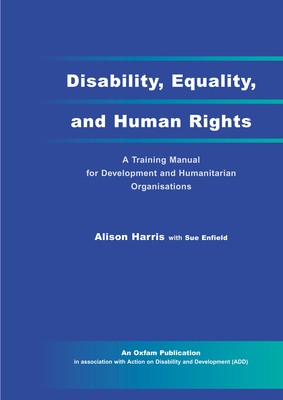
- We will send in 10–14 business days.
- Author: Alison Harris
- Publisher: Oxfam
- ISBN-10: 0855984856
- ISBN-13: 9780855984854
- Format: 22.9 x 29.2 x 2.9 cm, minkšti viršeliai
- Language: English
- SAVE -10% with code: EXTRA
Reviews
Description
This book's basic premise is that disabled people themselves know best what their needs are and that they should be involved in the planning and delivery of relief and development initiatives. The most effective support that agencies can offer is to empower them to claim their basic human rights and their civil and legal rights. The text is based on the experience of Oxfam staff working before, during and after the crisis in Kosovo; but its principles and practical training materials can be applied far more widely. Case studies from Africa and Asia arising from the work of Action and Disability and Development (ADD) show how the values of equality, empowerment and autonomy that are promoted by the social model of disability are universal in their relevance. It suggests practical materials particularly useful to trainers working in geographically isolated areas without access to sophisticated equipment. Most activities and exercises can be adapted for use in groups of people with a wide range of impairments and educational levels.
Foreward
Preface
Acknowledgements
Introduction
Part 1: The principles of Disability Equality training
Part 2: The practice of Disability Equality training
Resources
Appendix
General index
Index of training methods
EXTRA 10 % discount with code: EXTRA
The promotion ends in 23d.02:23:38
The discount code is valid when purchasing from 10 €. Discounts do not stack.
- Author: Alison Harris
- Publisher: Oxfam
- ISBN-10: 0855984856
- ISBN-13: 9780855984854
- Format: 22.9 x 29.2 x 2.9 cm, minkšti viršeliai
- Language: English English
This book's basic premise is that disabled people themselves know best what their needs are and that they should be involved in the planning and delivery of relief and development initiatives. The most effective support that agencies can offer is to empower them to claim their basic human rights and their civil and legal rights. The text is based on the experience of Oxfam staff working before, during and after the crisis in Kosovo; but its principles and practical training materials can be applied far more widely. Case studies from Africa and Asia arising from the work of Action and Disability and Development (ADD) show how the values of equality, empowerment and autonomy that are promoted by the social model of disability are universal in their relevance. It suggests practical materials particularly useful to trainers working in geographically isolated areas without access to sophisticated equipment. Most activities and exercises can be adapted for use in groups of people with a wide range of impairments and educational levels.
Foreward
Preface
Acknowledgements
Introduction
Part 1: The principles of Disability Equality training
Part 2: The practice of Disability Equality training
Resources
Appendix
General index
Index of training methods


Reviews